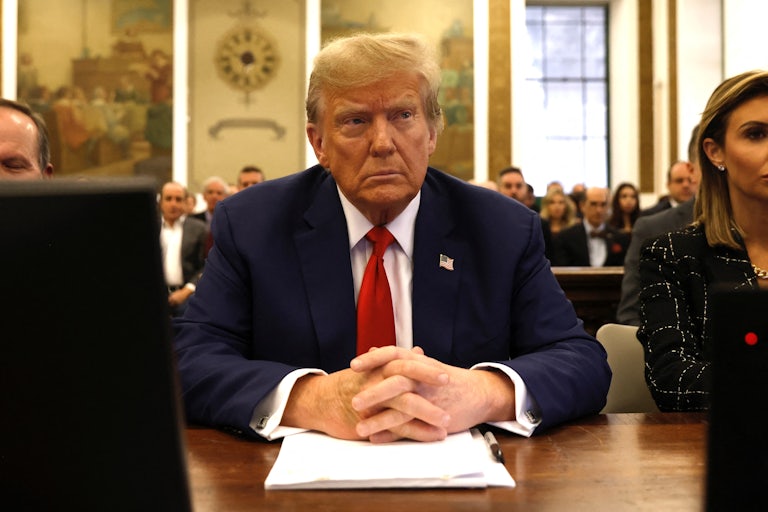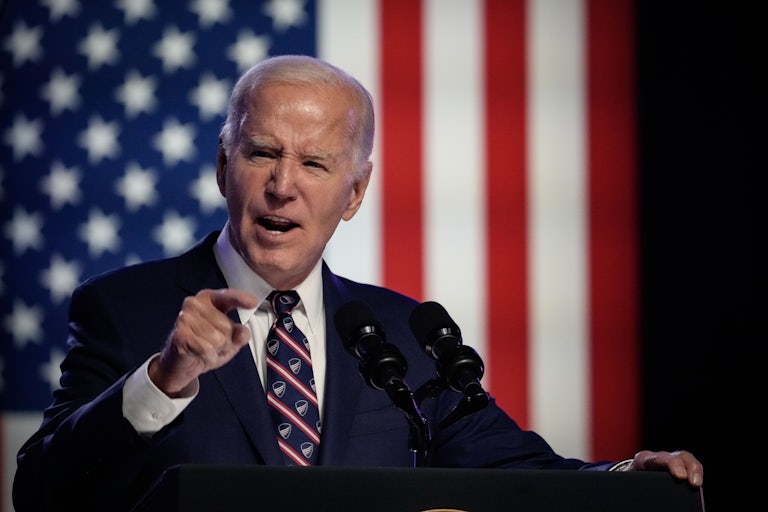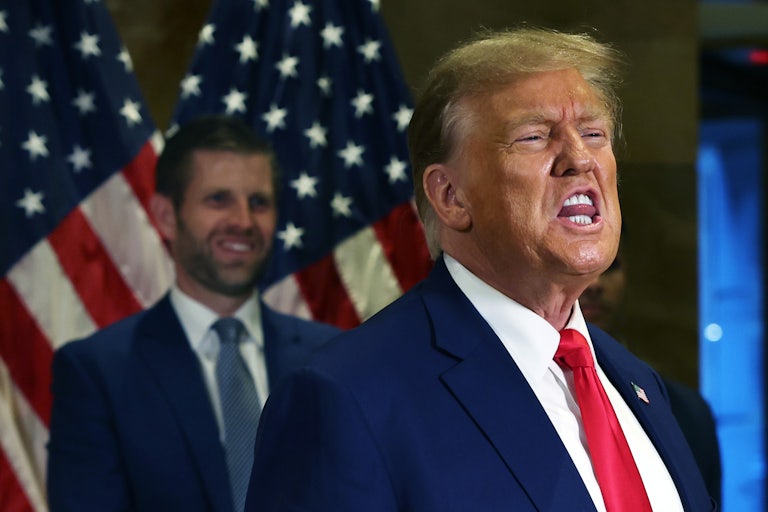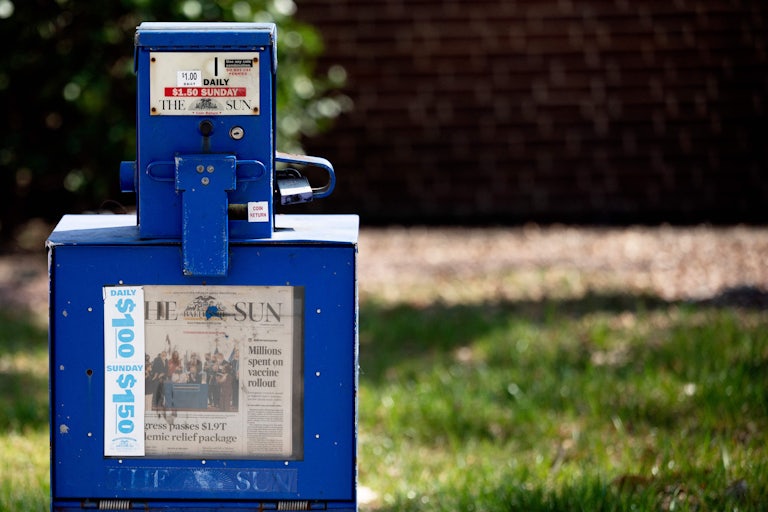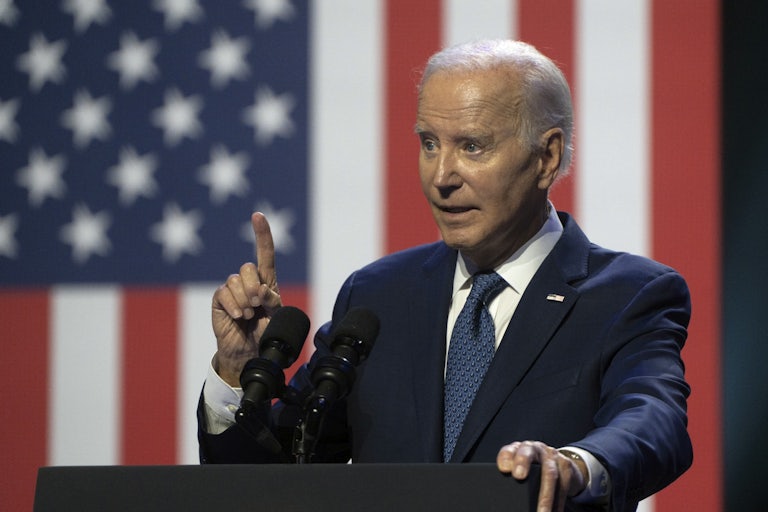Forget Biden’s SOTU Performance, and Focus on Tiny, Weak Mike Johnson
The House speaker lived down to the moment at the State of the Union on Thursday night.
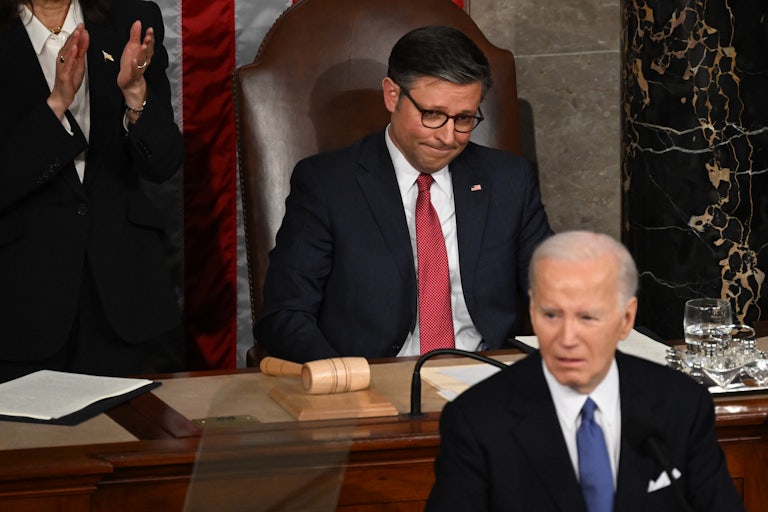
Joe Biden more than made it through Thursday night’s State of the Union address. That moment that his supporters always fear—the major brain fart, the confusing of Nikki Haley with Nancy Pelosi (oh wait, that was someone else)—never came. Not only did it not come, but most of the energy was dramatically positive. As is the morning-after conventional wisdom. Politico’s Playbook called it the “turn-the-tables SOTU,” reporting that the Biden campaign’s best two hours of fundraising in this cycle were from 9 to 11 p.m. last night. A CNN flash poll found that 62 percent thought the policies Biden laid out would move the country in the right direction.
He had his stumbles, and that Laken Riley moment was pretty cringey. But mostly he threw punches—and he landed almost all of them. As TNR’s Osita Nwanevu wrote: “That overall impression—of a vigorous president, strong enough to take the fight to his detractors—will linger more deeply in the minds of most who watched than the substance of anything he said.”
But let’s not talk about Biden. Let’s talk instead about that little guy in the chair over the president’s left shoulder. House Speaker Mike Johnson showed, in his histrionic facial expressions, everything that’s wrong and idiotic and dangerous and even treasonous about the Republican Party.
Johnson was ridiculous. He was small. Granted it’s not always easy for an opposition party leader to figure out how to comport him or herself during a State of the Union. The camera is on you for an hour or more, yet you can’t speak. You’re not going to join in on the frequent applauses, except rarely. Johnson did applaud Biden’s call for aid to Ukraine early in the speech, which he does seem to support personally, even though he’s too afraid of his wingnut caucus to allow a straight-up vote and thus may go down in history as the one person more than any other who handed Vladimir Putin the keys to Kyiv. So you sit there awkwardly.
Johnson decided that the State of the Union was the right time to mug for the camera. And he laid it on like a silent-movie actor, so thick that you could practically see the girl tied on the railroad tracks and hear the piano music. He nodded and nodded—you know, that solemn, “more in anger than in sorrow” nod. And those eye rolls! He rolled his eyes more than a teenage girl listening to her father’s jokes (that’s an eye roll I know rather well).
And the things he rolled his eyes at! Most conspicuously, January 6. Here’s what Biden said: “We must be honest. The threat to democracy must be defended. My predecessor and some of you here seek to bury the truth about Jan. 6. I will not do that.” That drew a sustained eye roll. So did a mention of abortion rights and freedom. So did the border bill, which Johnson helped kill because Donald Trump would rather have border chaos.
Actually that one was more of a head shake, which went on a few seconds longer than it had any justification to. Mind you, he did that even as GOP Senator James Lankford, the chief negotiator on the border bill, listened to Biden lay out its provisions and nodded, clearly saying, “That’s true.” They’ll be coming for him today, the sellout. Johnson also shook his head at “buy American.” Seriously?!
And even this relatively nonpartisan sentiment drew an eye roll: “The very idea of America is that we are all created equal, deserve to be treated equally throughout our lives. We’ve never fully lived up to that idea, but we’ve never walked away from it either.”
Once upon a time, those sentences would have elicited more than a smattering of bipartisan applause. There were plenty of Republicans who understood the nation as aspiring to its stated ideals. Even Ronald Reagan renewed the Voting Rights Act back in 1982, saying at the signing ceremony: “As I’ve said before, the right to vote is the crown jewel of American liberties, and we will not see its luster diminished.”
But today? This Republican Party doesn’t believe we’re all equal. This Republican Party, and specifically this speaker, thinks that if you’re not a right-wing Christian, you are not on some level a good American. Exaggeration? Johnson is tight with something called the National Association of Christian Lawmakers. Go inform yourself about some of what they’re up to.
It wasn’t just Johnson. It was Marjorie Taylor Greene in that ridiculous getup and MAGA hat, which was in apparent violation of House rules. It was Lindsey Graham sitting there with that embarrassed smile pasted on his face. It was the MAGA screamer in the gallery. It was Alabama Senator Katie Britt’s lame and all-over-the-place response—the only person who was popping champagne over that speech was Bobby Jindal, because it arguably moved him from worst State of the Union response of all time to second worst. It was the Republicans en masse sitting there dumbstruck time after time after time as this man who, according to the news channel they watch, can’t string two sentences together or remember his own middle name delivered zinger after zinger that laid bare to Americans the Republican Party’s extremism.
And that, in the end, is what was deft and unexpected about this speech. Biden drew contrasts on substance that showed how radical the Trump GOP has become on virtually every issue. November 5 is a long way away, and there will be bad days. But this night showed us something we haven’t seen hard evidence of in a while: how Joe Biden can win this election, and how the party and the speaker on the wrong side of history can lose it.
